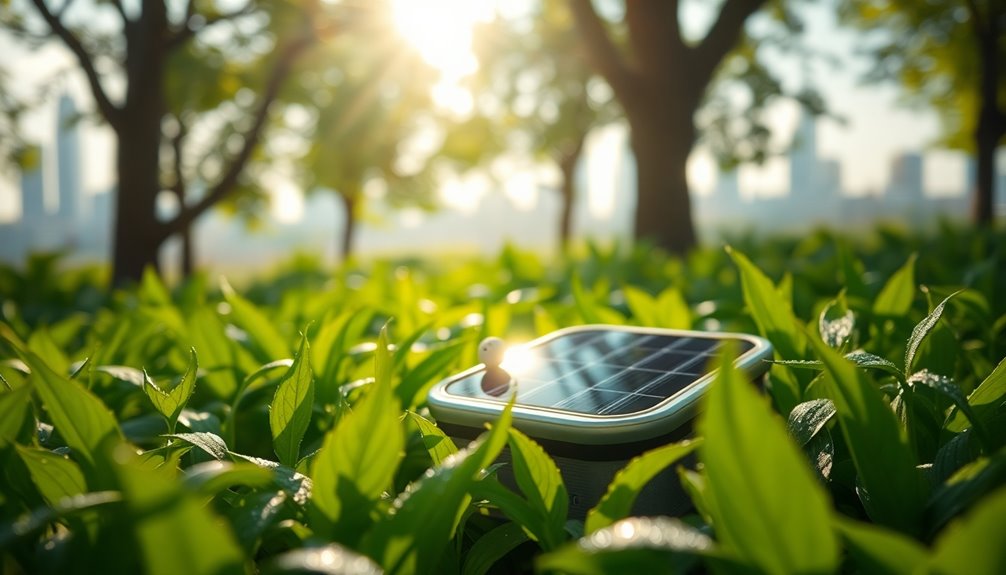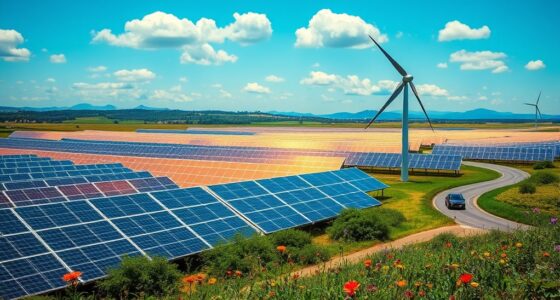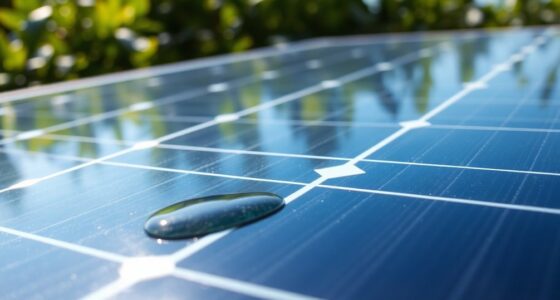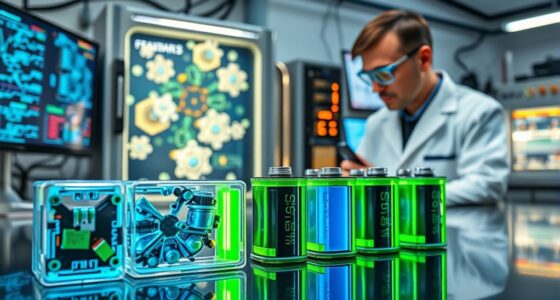The Internet of Things (IoT) transforms sustainability by connecting smart devices that optimize resource management and reduce waste. With real-time monitoring, you can track energy use and consumption patterns, making informed decisions that promote efficiency. Smart technologies, like thermostats and lighting systems, help lower energy consumption while connected solutions streamline waste management. As you explore further, you'll discover more innovative examples of how IoT can lead to a greener future.
Key Takeaways
- IoT enhances sustainability by optimizing resource management through real-time monitoring of energy, water, and raw materials.
- Smart sensors and analytics help reduce waste by preventing overproduction and optimizing inventory levels.
- Energy-efficient IoT devices, like smart thermostats and lighting, minimize energy consumption while maximizing comfort and efficiency.
- Predictive maintenance enabled by IoT can prevent resource depletion and extend the lifespan of equipment.
- Addressing data privacy and energy consumption of IoT devices is crucial for achieving sustainability goals.
Understanding the Internet of Things (IoT)
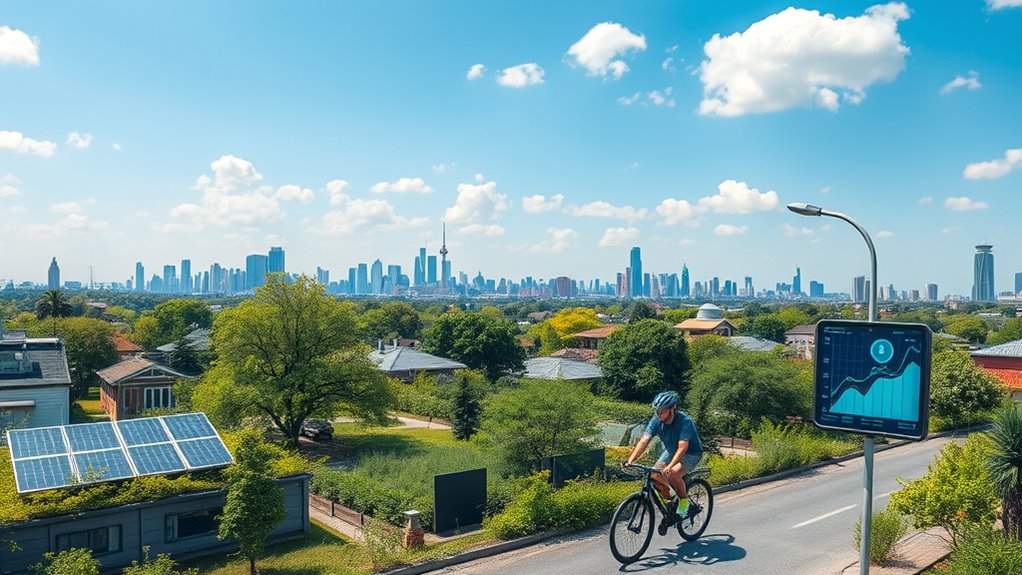
As you explore the concept of the Internet of Things (IoT), you'll find it encompasses a vast network of interconnected devices that communicate and share data.
These devices range from everyday items like smart thermostats and wearables to complex systems in industries. They collect and analyze real-time information, enabling automation and efficiency.
By connecting appliances to the internet, you can control them remotely, monitor their performance, and even receive notifications. This connectivity allows for smarter decision-making, reducing energy consumption and waste.
Connecting appliances to the internet empowers remote control, performance monitoring, and smarter decision-making, leading to reduced energy consumption and waste.
As you dive deeper, you'll uncover how IoT impacts various sectors, enhancing convenience while promoting innovation.
Understanding IoT is crucial in recognizing its potential to transform our daily lives and the world around us.
The Role of IoT in Resource Management

While managing resources efficiently is crucial for sustainability, the Internet of Things (IoT) offers innovative solutions that enhance this process.
With IoT devices, you can monitor energy usage, water consumption, and raw material supply in real time. Smart meters provide insights, helping you adjust consumption patterns and reduce waste.
By integrating sensors in your operations, you can optimize resource allocation, ensuring you use only what you need. IoT can also facilitate predictive maintenance, preventing resource depletion by addressing issues before they escalate.
As you implement these technologies, you'll not only improve efficiency but also contribute to a more sustainable future. Embracing IoT in resource management empowers you to make data-driven decisions that align with your sustainability goals.
Waste Reduction Through IoT Innovations
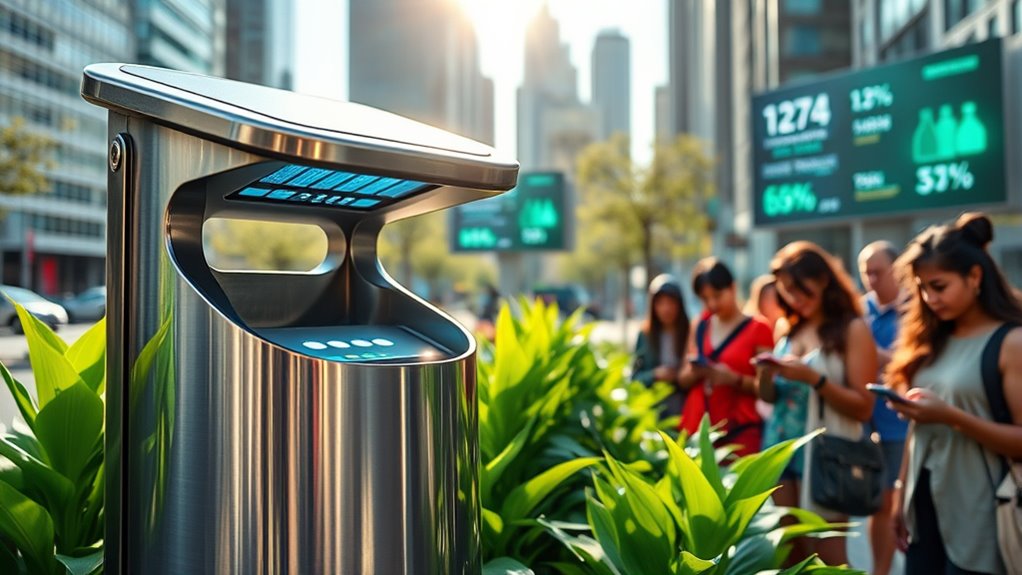
Through the power of IoT innovations, you can significantly reduce waste across various sectors. Smart sensors and connected devices enable real-time monitoring of inventory levels, helping businesses avoid overproduction and excess stock.
In agriculture, IoT solutions can track soil health and moisture levels, ensuring optimal planting and reducing food waste. Waste management also benefits; connected bins can signal when they're full, optimizing collection routes and minimizing unnecessary trips.
By utilizing data analytics, you can identify patterns and make informed decisions, further streamlining operations. Ultimately, integrating IoT technology allows you to foster a more sustainable approach, transforming how you manage resources and waste.
Embracing these innovations not only benefits the environment but also enhances your operational efficiency.
Enhancing Energy Efficiency With Smart Technology

By leveraging smart technology, you can significantly enhance energy efficiency across various applications.
Smart thermostats, for instance, adjust heating and cooling based on your habits, ensuring energy isn't wasted. Smart lighting systems can automatically turn off when you leave a room or adjust brightness based on natural light, cutting down electricity use.
Additionally, IoT-enabled appliances provide real-time data on energy consumption, allowing you to make informed decisions about usage. You can also integrate renewable energy sources, like solar panels, with smart grids to optimize energy distribution and minimize waste.
Case Studies: Successful IoT Implementations for Sustainability

Around the world, numerous organizations are successfully integrating IoT solutions to enhance sustainability efforts.
For example, smart agriculture platforms use IoT sensors to monitor soil moisture and optimize irrigation, reducing water waste and increasing crop yields.
In urban settings, cities deploy smart waste management systems that utilize IoT-enabled bins to optimize collection routes, minimizing fuel consumption and emissions.
Another case involves energy companies utilizing IoT devices to track consumption patterns, empowering consumers to make informed decisions about their energy use.
These implementations not only promote environmental responsibility but also drive cost savings.
Challenges and Solutions in IoT Sustainability
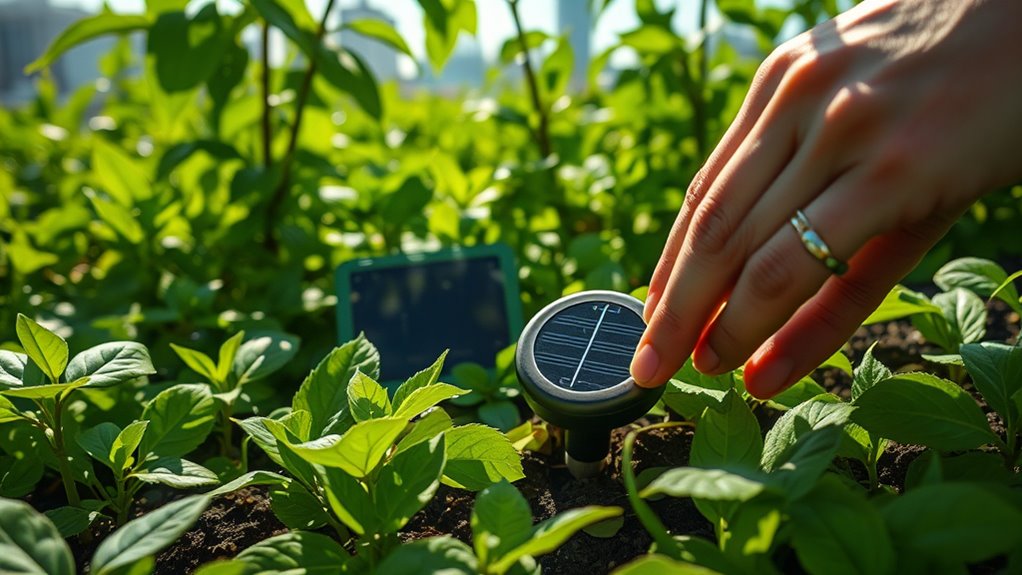
Although IoT technology offers significant potential for enhancing sustainability, several challenges hinder its widespread adoption. One major issue is data privacy; as more devices connect, your personal information could be at risk.
Additionally, the energy consumption of IoT devices can counteract their sustainability goals. To tackle these problems, you can implement strong encryption and data management practices to protect user information.
Choosing energy-efficient devices and optimizing their operation can also reduce their overall carbon footprint. Moreover, standardizing protocols across devices fosters interoperability, making systems easier to manage and scale.
The Future of IoT and Its Impact on Environmental Stewardship
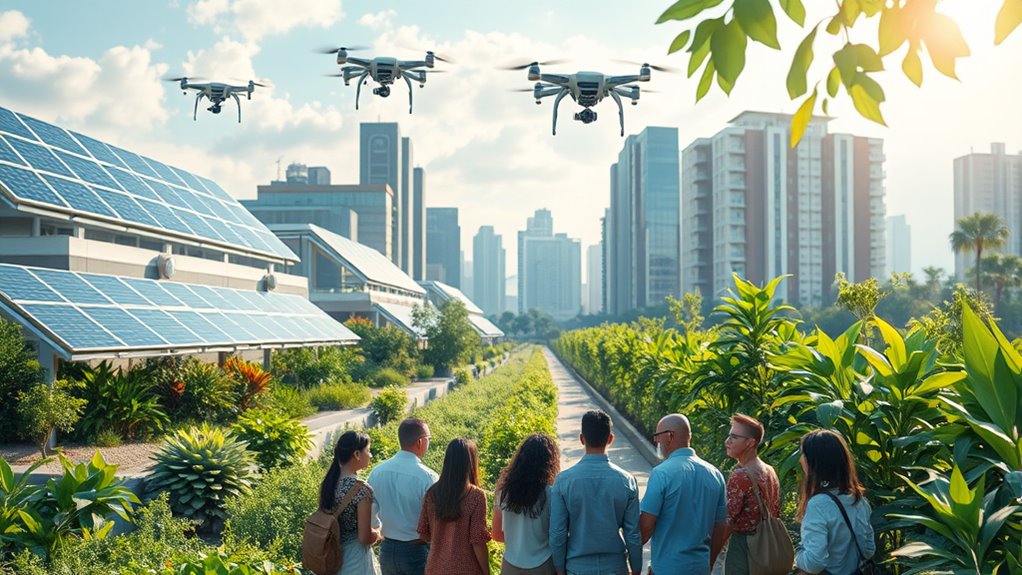
As the Internet of Things (IoT) continues to evolve, it holds the promise of transforming environmental stewardship in profound ways.
You'll see smart sensors monitoring air quality, enabling cities to take immediate action against pollution. IoT devices can optimize energy consumption in homes and businesses, reducing waste and lowering carbon footprints.
Imagine smart agriculture systems that use data to minimize water usage and enhance crop yields, ensuring food security sustainably. With real-time data analytics, you can track and manage resources more efficiently, promoting responsible consumption.
The future of IoT isn't just about convenience; it's about creating a sustainable world. By embracing these technologies, you'll play a crucial role in fostering a greener planet for future generations.
Frequently Asked Questions
How Does Iot Contribute to Wildlife Conservation Efforts?
You might wonder how technology plays a role in wildlife conservation. By using sensors and tracking devices, researchers can monitor animal movements and behaviors in real-time.
This data helps you identify threats, such as poaching or habitat loss, allowing for quicker responses. Additionally, you can gather insights on migration patterns, which are crucial for creating effective conservation strategies.
What Are the Privacy Concerns Related to Iot Devices?
When you use IoT devices, privacy concerns often arise.
These devices can collect vast amounts of personal data, making it crucial to consider what information you're sharing.
Hackers might exploit vulnerabilities, leading to unauthorized access to your data.
Plus, companies may not always be transparent about how they use or store your information.
It's essential to stay informed and take steps, like adjusting privacy settings, to protect your personal data effectively.
Can Iot Technology Be Used in Urban Planning?
Imagine a city where every streetlight knows when to shine, guiding you home safely.
IoT technology can transform urban planning by collecting real-time data on traffic, air quality, and public safety. You can use this information to design more efficient transportation systems, enhance green spaces, and create smarter infrastructure.
How Does Iot Impact the Agricultural Sector?
IoT significantly transforms the agricultural sector by enabling real-time monitoring and data collection. You can track soil moisture levels, crop health, and weather conditions, allowing for precise irrigation and fertilization. This reduces waste and maximizes yields.
With smart sensors, you gain insights into pest activity and plant growth, helping you make informed decisions. Ultimately, IoT enhances efficiency and productivity, making your farming practices more sustainable and profitable in the long run.
What Industries Are Most Likely to Benefit From Iot Sustainability Initiatives?
Imagine a world where industries thrive like never before!
You'll see manufacturing, logistics, and energy sectors reaping huge rewards from sustainability initiatives. By adopting smart technologies, they're cutting waste, boosting efficiency, and saving costs.
Agriculture's going green with precision farming, while transportation's optimizing routes for reduced emissions.
Retail's embracing eco-friendly practices, making every purchase count.
In this vibrant landscape, you're part of the revolution, driving change and innovation!
Conclusion
As you embrace the Internet of Things, picture a world where smart devices seamlessly communicate, transforming waste into resources and energy into efficiency. Imagine cities humming with life, where sensors monitor air quality and conserve water, all working together like a well-tuned orchestra. With each innovative step, you're not just witnessing change—you're part of a movement that nurtures the planet. The future is bright, and by harnessing IoT, you're helping create a sustainable legacy for generations to come.
